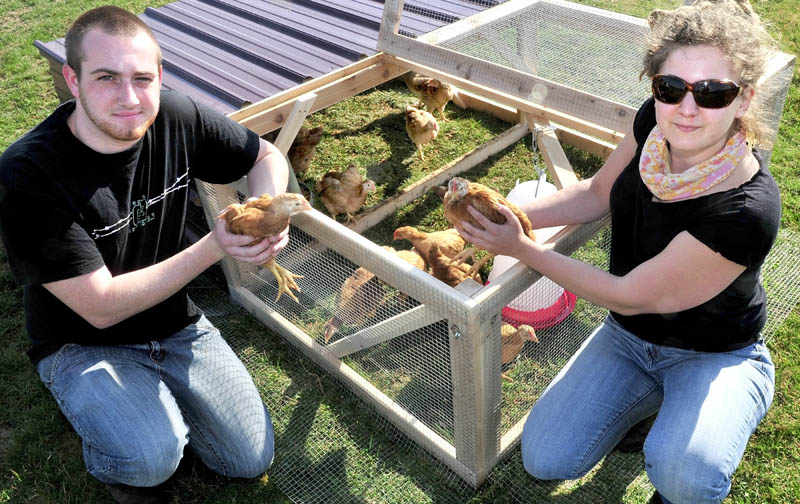UNITY — Three-dozen chickens pecking around Quaker Hill are generating discussion among students about sustainable ecosystems, food scarcity and animal care.
And soon they’ll be dinner for area people in need of food.
The chickens are part of “Pastured Poultry for Food Security,” a project created to breed farmers and relieve hunger in local communities.
The Future Farmers of America at Unity College and at Waldo County Technical Center are collaborating on the project, funded by a $2,000 National Future Farmers of America’s Food For All grant.
Sara Trunzo, Unity College food and farm projects coordinator and FAA adviser, said the project is typical of many at the environmental college: it’s hands-on, altruistic and sustainability-minded.
College junior Shayne Van Leer has headed up the campus effort.
Van Leer, the college’s FFA vice president, researched costs of feed and equipment, compared poultry breeds, developed a brooding habitat and established a care management system.
And since the postal service delivered the just-born chicks March 16, Van Leer has helped monitor their temperature, fed and watered them and cleaned the pens.
In about three weeks, the Red Broiler chickens will be slaughtered at a local butcher shop and FAA participants will deliver the poultry to the Volunteer Regional Food Pantry in Unity and Belfast Soup Kitchen.
Trunzo, who is on the board at the regional pantry, said food is truly scarce for some people.
One in six Americans will experience food insecurity in 2012, according to the National FFA.
College senior Ryan Green said food insecurity exists in some cities where he has lived because of “food deserts” — places where there are no grocery stores or where they are inaccessible to low-income people.
The senior sustainable agriculture major said he realized when he came to Unity that food insecurity also exists in rural areas where plenty of food is grown.
While Unity College students have often donated fresh vegetables to the regional food pantry, Trunzo said this will be the first time they have given fresh meat.
The chickens, who were initially housed in an incubator in a small barn on campus, are now on a lawn inside a chicken tractor — a 5-foot by 7-foot shelter-pen.
Chicken wire on all sides and half the roof (the other half is a metal covering) protects chicks from searing sun, rain and predators. There is no bottom so chickens roam, scratch and fertilize the pasture.
The pen, which is about 2 feet high, has two wheels so it can be regularly pulled to another spot on the grass.
Trunzo said the chicks’ manure is a great fertilizer and that the chance to range freely gives the chicks a good quality of life.
“They are well cared for and in the big picture they are part of a sustainable ecosystem,” said Trunzo, who once was a vegetarian.
The college’s captive wildlife care and education staff has been extremely helpful, Trunzo said, giving advice about healthy, humane habitats, animals’ abilities to teach people and the proper handling of chicks.
“They have made us think. To us, this is a tractor of food,” Trunzo said, nodding toward the chickens. “They have asked us to rise to the challenge. It’s a great extra layer (of education).”
Beth Staples — 861-9252
bstaples@centralmaine.com
Send questions/comments to the editors.



Success. Please wait for the page to reload. If the page does not reload within 5 seconds, please refresh the page.
Enter your email and password to access comments.
Hi, to comment on stories you must . This profile is in addition to your subscription and website login.
Already have a commenting profile? .
Invalid username/password.
Please check your email to confirm and complete your registration.
Only subscribers are eligible to post comments. Please subscribe or login first for digital access. Here’s why.
Use the form below to reset your password. When you've submitted your account email, we will send an email with a reset code.